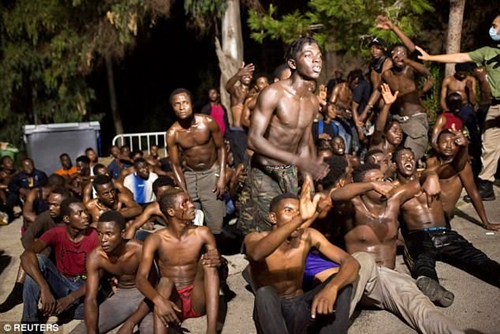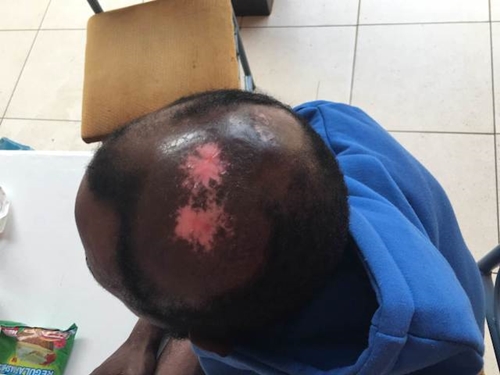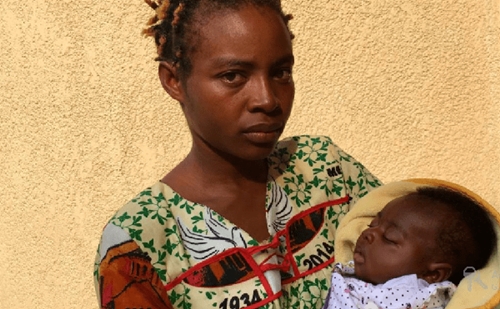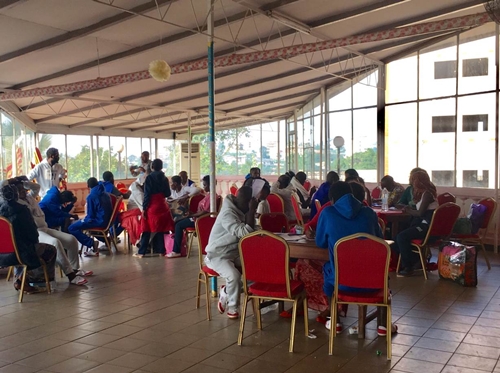
File photo
The new slave trade-human trafficking in Libya is being carried out
by many nationalities, including Nigerians and Ghanaians, according to a
Cameroonian returnee, who was abducted in the country.
Foka Fotsi, who was trafficked twice, told Reuters that those in
charge of one of the places where he was held included Ghanaians and
Nigerians. Fotsi story corroborated another testimony by a Nigerian in
the southern state of Edo, who identified one Charles, a Nigerian as the
trafficking kingpin.
Unable to find work to support his family, Fotsi decided to leave
Cameroon last year, but fell into the hands of a Libyan kidnap ring
before reaching Europe.
“There was torture like I’ve never seen. They hit you with wooden bats, with iron bars,” he said, removing the hood of his sweatshirt and showing the still raw red wounds on his skull.
“They hang you from the ceiling by (your) arms and legs and
then throw you down to the floor. They swing you and throw you against
the wall, over and over again, ten times.
“They are not human beings. They are the devil personified.”

Foka Fotsi- battered in a camp run by Nigerians and Ghanaians
Christelle Timdi, another Cameroonian recounted her horrendous experience in the north African country.
When uniformed men boarded the overloaded rubber dingy carrying her
and her boyfriend to a new life in Europe, she thought the Italian
coastguard had come to rescue them.
But the men took out guns and began to shoot. “Many people fell in the sea,”
the 32-year-old Cameroonian said as she described seeing her boyfriend,
Douglas, falling in the water and disappearing into the darkness.
The gunmen took Timdi and her fellow passengers back to Libya where
they were locked up, r*ped, beaten and forced to make calls to their
families back home for ransom payments to secure their freedom.
Timdi, who flew back to Cameroon last week, told her story as
international outcry escalated over a video which appeared to show
African migrants being traded as slaves in Libya.
Libya’s U.N.-backed government has said it is investigating and has promised to bring the perpetrators to justice.
Timdi said she had not seen the footage broadcast by CNN, but had witnessed the trade in humans while in Libya.
“I saw it with my own eyes,” she said, describing how she had seen a Senegalese man buying an African migrant.

Timdi: witnesses serial raping of women in the slave camps
Libya is the main jumping off point for migrants trying to reach Europe by boat.
Timdi said many traffickers posed as marine guards, police officers and taxi drivers to ensnare victims.
There were around 130 other migrants on her boat when the gunmen opened fire in the middle of the night, Timdi said.
After being taken back to Libya they were locked in an abandoned
factory building where men would grab and rape the girls and women – and
sometimes even the men.
“We tried to hide the younger girls among us,” Timdi said,
describing the terrifying moments when the guards would scour the room
with torches, searching for their next victims.
“I was heavily pregnant – that’s why I wasn’t r*ped. And it’s
all done in front of others – they say it’s so that you know what will
happen to you if you don’t pay up.”
Timdi said the facilities used by traffickers appeared to be well
organised and guarded, adding that most people inside wore fake police
or military uniforms.
“The place was surrounded by army-style vehicles with guns ready to fire, so we didn’t dare try and escape.”
Timdi’s family paid 1 million CFA francs ($1,800), frantically
collected from relatives and friends, to free her. But she said ransoms
were no guarantee of safety.
The traffickers work with a network of taxi drivers who are
supposed to transfer released migrants to migrant camps – but who often
re-traffick them, Timdi said.
“If they send you a good taxi, you’ll arrive at your
destination, but if it’s a bad taxi the driver will sell you on to
someone else,” she said.
“There are people who have been resold twice, three times. And
when you call your family to tell them that you’ve been resold once
again, no one will believe you, they won’t send more money to free you.”
Timdi was released by her captors in October and gave birth to a baby girl, Brittanie, in a Libyan hospital just days later.
Timdi and Fotsi were among 250 Cameroonians who were flown home
this week by the International Organization for Migration (IOM) as part
of a voluntary return scheme for migrants stranded in Libya.

A
group of Cameroonian migrants brought back to Yaoundé from Libya
pictured on November 22 2017. Inna Lazareva/ Thomson Reuters Foundation
The programme, funded by the European Union, provided returnees
with clothing and medical checks. The most vulnerable, including
pregnant women, also received around 400 euros ($475).
IOM Cameroon head Boubacar Saybou said it was launching a programme
to help migrants set up businesses, and will also provide start-up
funding.
“We need to create opportunities for them here. That’s what’s important,” he said.
Fotsi said he hoped to follow up on the scheme. But for now his most pressing problem was finding a place to sleep.
“I pray that God gives me work that I can do here,” he said. “If we don’t get work you’ll find many of us walking the streets again.”
*Adapted from a Thomson Reuters Foundation report written by Inna Lazareva.
No comments:
Post a Comment